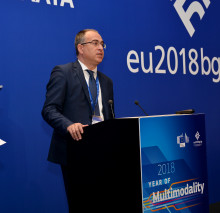The importance of combined transportations aimed at providing a more eco-friendly, low-cost and faster transportation of cargo, grows ever larger, said the Deputy Minister of Transport, Information Technology and communications, Velik Zanchev, at the opening of the High-level Conference on Multimodal Freight Transport today in Sofia. The topic is part of the Ministry’s priorities within the framework of the Bulgarian Presidency of the Council of the EU.
“We have already started revising the Directive on establishing common rules for combined freight transportations. The regulatory document was adopted 25 years ago and has not been implemented equally in member states, which prevents its full potential to be utilized and cargo transportations with high added value to be carried out”, pointed out Deputy Minister Zanchev. European legislation in the field has to be revised to serve as an instrument for the development of multimodal connections between existing transport systems and the construction of new ones in the EU. “The deployment of the directive will have a positive effect on the business, promoting combined freight transportations in the Union”, he added.
The Deputy Minister also highlighted the importance of transferring cargo transportations from road to railway, inland waterway and maritime transport. Relieving road infrastructure will significantly reduce the negative effect on environment and will ensure better safety for people. The establishment of favorable conditions for the development of multimodal transport and logistics requires the construction of modern intermodal terminals at ports and at major transport lines crossings, as they provide the most significant connection in a logistic chain, he went on in his speech.
EU Transport Commissionaire Violeta Bulc participated in the event. In her opening speech, she pointed out that multimodality requires a common approach to all transport modes focusing on high added value projects.
The forum discusses the opportunities for achieving more sustainable and effective transport and logistic chains within and outside Europe. The participants in the meetings deliberated on railway and port connections with a focus on the construction of intermodal terminals and the adjacent infrastructure. Some best practices in overall completion of transport corridors and construction of missing sections were presented. The agenda of the conference foresees opportunities for financing transport infrastructure between the EU and the Western Balkans.
Ministers and Deputy Ministers of Transport from the countries in the Western Balkans and the EU participated in the discussions, as well as representatives of Bulgarian and European institutions in the transport sector, the European Commission, the World Bank, port operators, and leading European transport and logistic companies.












